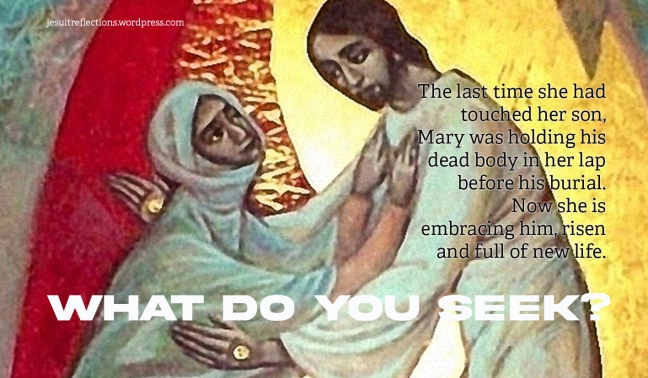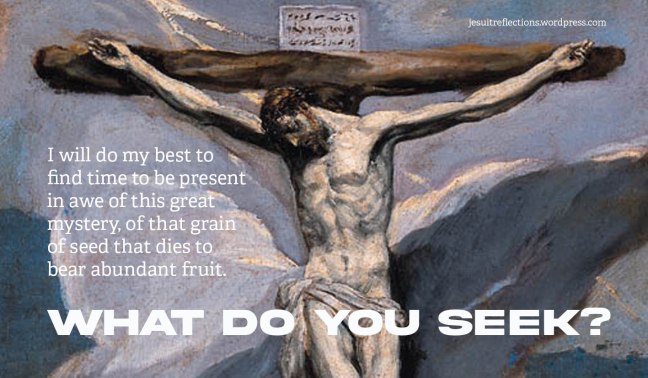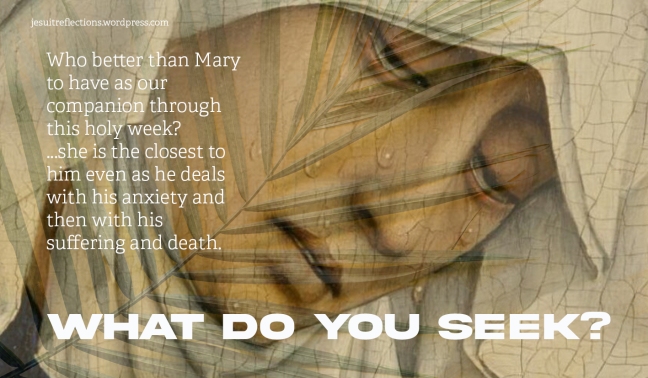(Traduzione in italiano ed albanese in fondo alla pagina – This blog post is also translated into Italian and Albanian – please scroll)
[15] LENT 2024 | Christ our pasch is Risen, let us rejoice. Hallelujah

The last time she had touched her son, Mary was holding his dead body in her lap before his burial. Now she is embracing him, risen and full of new life. We can never fully understand the Resurrection, but we can ask for the grace to feel the joy of the risen Jesus. As we shared his sorrow and anguish, we seek to feel the great joy of the Risen one.
The Gospels, so attentive to narrate the passion in the smallest details, surprise us by not describing at all how the resurrection took place. They only say that the women who went to anoint Jesus’ body only found an empty tomb, but then go on to tell us what happened when the Risen Jesus meets his friends. They do not recognise him at first, even though they were seeking him.
The Risen Jesus brings consolation and solace to those who were sorrowful at his absence, he brings clarity and confirmation to the faith and love of his followers. He also sends all those he meets to proclaim this great event: the one who was killed unjustly is now alive, forever.
The Acts of the Apostles, which we will read at mass in the weeks after Easter, describe how faithful the first Christians were to this mission. They preached Christ, the promised one who was killed by the authorities, but is now alive, he is risen! We can guarantee this is so, because we were with him, we saw him, we heard him speak, we shared his food. They barely spoke of anything else.
This is our mission too. We need to ask ourselves how faithful we are to proclaim Jesus as the Risen one, or whether we speak and think of it only once a year. In a world riven by war, when the land where all this took place is drowned in violence and hatred, what better sign of hope can we give than the fact that one of us has overcome even death?
To do this effectively, we need, like to apostles, to be witnesses to the Resurrection, to be able to say, We have met the Risen Jesus, we know he is alive. He is my consolation, the basis of my hope and love.
May we be able to say and feel, Jesus, our pasch is Risen. Let us rejoice and be glad. Hallelujah.
AUDIO-VISUAL AID: With every post we share a music video or some other material which we hope will help you to enter into reflection. Today let yourself be transported to the glorious moment of the resurrection while listening to this beautiful instrumental piece by Ennio Morricone – from ‘Secret of the Sahara’.
_________
[15] Cristo nostra Pasqua è Risorto, rallegriamoci. Alleluia
L’ultima volta che aveva toccato suo figlio Maria lo sosteneva sul grembo prima della sepoltura. Ora lo abbraccia risorto e pieno di vita nuova. Non capiremo mai completamente la Resurrezione, ma possiamo chiedere la grazia di sentire la gioia di Gesù risorto. Come abbiamo condiviso il suo dolore e la sua angoscia, ora chiediamo di sentire la sua grande gioia di Risorto.
I Vangeli, così attenti nel narrare la passione nei minimi dettagli, ci sorprendono nel non descrivere affatto come sia avvenuta la resurrezione. Ci dicono solamente che le donne, che erano andate per ungere il corpo di Gesù, hanno trovato la tomba vuota, ma poi continuano raccontando di quando Gesù Risorto incontra i suoi amici. Di come all’inizio non lo riconoscano, sebbene lo stiano cercando.
Gesù Risorto porta consolazione e conforto a coloro che erano tristi per la sua mancanza, porta luce e conferma alla fede e all’amore dei suoi discepoli. Egli inoltre manda tutti quelli che incontra ad annunciare questo grande evento: Colui che era stato ucciso ingiustamente ora è vivo, per sempre.
Gli Atti degli Apostoli, che leggeremo nelle messe delle settimane dopo Pasqua, descrivono come i primi cristiani siano stati fedeli a questa missione. Essi annunciano: il Cristo, il messia promesso, è stato ucciso dalle autorità, ma ora è vivo, è risorto! Noi possiamo testimoniarlo, perché eravamo con Lui, lo abbiamo visto, lo abbiamo udito parlare, abbiamo condiviso il cibo con Lui. Non riescono a parlare d’altro.
Questa è anche la nostra missione. Abbiamo bisogno di chiederci quanta fede abbiamo da proclamare Gesù come il Risorto, o se ne parliamo e ci pensiamo solo una volta l’anno. In un mondo lacerato dalla guerra, dove la terra in cui tutto questo è accaduto è immersa nella violenza e nell’odio, quale maggior segno di speranza possiamo offrire se non che uno di noi ha vinto persino la morte?
Per farlo davvero abbiamo bisogno, come gli apostoli, di essere testimoni della resurrezione, di poter dire: abbiamo incontrato Gesù Risorto, sappiamo che Egli è vivo. Lui è la mia consolazione, il fondamento della mia speranza e dell’amore.
Che possiamo davvero dire e di sentire che Gesù, nostra Pasqua, è Risorto. Rallegriamoci ed esultiamo. Alleluia.
_______
[15] Krishti Pashka jonë u ngjall, le të gëzojmë. Aleluja
Herën e fundit që kishte prekur djalin e saj, Maria e mbajti trupin e tij të pajetë në prehër para varrimi i tij .Tani ajo po e përqafon, i ringjallur dhe plot jetë të re. Ne kurrë nuk mundemi të kuptojmë plotësisht Ringjalljen, por ne mund të kërkojmë hirin për të ndjerë gëzimin e Jezusit të ringjallur. Ndërsa ndamë pikëllimin dhe ankthin e tij, tani kërkojmë të ndjejmë gëzimin e madh të një të Ngjallurit.
Ungjijtë, aq të vëmendshëm për të rrëfyer mundimin në detajet më të vogla, na befasojnë ne ate qe nuk përshkruajne fare se si ndodhi ringjallja. Thonë vetëm se gratë që shkuan për të vajosur trupin e Jezusit gjeten vetëm varrin bosh, por pastaj vazhdojnë të na tregojnë se çfarë ndodhi kur Jezusi i Ngjallur takon miqtë e tij. Ata nuk do ta njohin në fillim, edhe pse po e kërkonin.
Jezusi i Ngjallur sjell ngushëllim dhe lehtësim për ata që ishin të pikëlluar nga Mungesa e tij, ai sjell qartësi dhe konfirmim në besimin dhe dashurinë e pasuesve të tij. Ai i dërgon gjithashtu të gjithë ata që i takon,për të shpallur këtë ngjarje të madhe: ai që u vra padrejtësisht është tani i gjallë, përgjithmonë.
Veprat e Apostujve, të cilat do t’i lexojmë në meshë në javët pas Pashkëve, përshkruajnë sa besnikë ishin të krishterët e parë ndaj këtij misioni. Ata predikuan Krishtin, të premtuarin ai i cili u vra nga autoritetet, por tani është gjallë, ai u ringjall! Ne mund ta garantojmë këtë, është kështu, sepse ishim me të, e pamë, e dëgjuam të fliste, ndamë ushqimin e tij. Mezi folën për ndonjë gjë tjetër.
Ky është edhe misioni ynë. Ne duhet të pyesim veten se sa besnikë jemi për të shpallur Jezusin, si një i vetëm , i Ngjalluri, apo nëse flasim dhe mendojmë për të vetëm një herë në vit. Në një botë të copetuar nga lufta, kur toka ku ndodhi e gjithë kjo është e mbytur në dhunë dhe urrejtje, çfarë më mirë si shenjë shprese mund të japim veç faktit që njëri prej nesh e ka mposhtur edhe vdekjen?
Për ta bërë këtë në mënyrë efektive, ne kemi nevojë, si apostujt, të jemi dëshmitarë të Ringjalljes, të jemi në gjendje të themi, Ne kemi takuar Jezusin e Ngjallur, ne e dimë se ai është gjallë. Ai është ngushëllimi im, ai është baza e shpresës dhe dashurisë sime.
Le të jemi në gjendje të themi dhe të ndjejmë, Jezusi, Pashka jonë u ringjall. Le të gëzojmë e të galdojmë. Aleluja.




 The apostles once asked Jesus, Teach us how to pray. He had once asked them, What do you seek? Now they ask him, Teach us what to ask for, teach us what to seek.
The apostles once asked Jesus, Teach us how to pray. He had once asked them, What do you seek? Now they ask him, Teach us what to ask for, teach us what to seek. I desire neither life nor death. Were the Lord to offer me a choice, I would not choose. I will only what he wills, and I am pleased with whatever he does. I have no fear of the last struggle, or of any pain, however great, which my illness may bring. God has always been my help; he has led me by the hand since I was a child, and I count on him now. Even though suffering should reach its furthest limits, I am certain he will never forsake me.
I desire neither life nor death. Were the Lord to offer me a choice, I would not choose. I will only what he wills, and I am pleased with whatever he does. I have no fear of the last struggle, or of any pain, however great, which my illness may bring. God has always been my help; he has led me by the hand since I was a child, and I count on him now. Even though suffering should reach its furthest limits, I am certain he will never forsake me.
 Jesus too had strong desires, and his search was wholly passionate. These words in the gospel of Luke (12: 49) give us a glimpse into Jesus’ heart. He is sharing what he is seeking: to set the world on fire with the good news that we have a merciful Father who sends his rain and sunshine equally on the good and the bad. Moreover, Jesus is telling us how much he would like his desire to be realised.
Jesus too had strong desires, and his search was wholly passionate. These words in the gospel of Luke (12: 49) give us a glimpse into Jesus’ heart. He is sharing what he is seeking: to set the world on fire with the good news that we have a merciful Father who sends his rain and sunshine equally on the good and the bad. Moreover, Jesus is telling us how much he would like his desire to be realised. I came across this phrase many years ago in Cardinal Basil Hume’s book, Searching for God, and I still find it a very consoling and inspiring phrase. Hume says that we might read a book about prayer, hear someone describe an excellent method of prayer, and we are all excited. Yet, when we go to pray, we discover ourselves to be totally incompetent:
I came across this phrase many years ago in Cardinal Basil Hume’s book, Searching for God, and I still find it a very consoling and inspiring phrase. Hume says that we might read a book about prayer, hear someone describe an excellent method of prayer, and we are all excited. Yet, when we go to pray, we discover ourselves to be totally incompetent: This is a suggestion we often come across in the Spiritual Exercises of St Ignatius. At different stages of the retreat he suggests that I ask for what I desire, with insistence. As I advance in the retreat, Ignatius suggests I ask for sorrow for my sins, for the strong desire to change, and later to know Jesus intimately so that I may love him more and follow him closely. In contemplating the passion I ask to identify myself with the suffering Jesus, and then to share his joy when he rises again.
This is a suggestion we often come across in the Spiritual Exercises of St Ignatius. At different stages of the retreat he suggests that I ask for what I desire, with insistence. As I advance in the retreat, Ignatius suggests I ask for sorrow for my sins, for the strong desire to change, and later to know Jesus intimately so that I may love him more and follow him closely. In contemplating the passion I ask to identify myself with the suffering Jesus, and then to share his joy when he rises again.